#decolonize your practice
Text
Psst Mabon (mah-bon not may-bon) is a figure from Welsh mythology whose name was appropriated by Aidan Kelly for the Wiccan wheel of the year and who has very little if anything to do with the Autumn Equinox so maybe this year make part of your celebrations about researching that and considering alternatives to something which is furthering the cultural damage Wales has already been through…………
#Mabon#appropriation#Aidan Kelly#decolonisation#decolonize your practice#Wicca#Wiccanism#wheel of the year#high holidays
80 notes
·
View notes
Text
Cultural appropriation.
This is such an important topic that needs to be spoken about, yet it seems to be brushed under the rug a lot by many practitioners.
Like I’ve said before I’ve spent years decolonising my practice, and I’m not saying I’m perfect in any way. But I’m always open to learn and change.
Recently I learnt that a word I used to use a lot as a British person was incredibly racist. A Romani creator did an amazing Tik tok on it, I then did my own research into. I apologise for using that word, and moving forward I shall never use it again and try to educate other people about it.
I think this is an important thing to learn, you do not know everything, no one does, but if minority groups are telling you that you’re saying or doing something wrong, listen to them. DO NOT speak over them, or for them. Our job as allies is to uplift the marginalised groups and help them when they want us to.
If you want to start decolonising your practice the best place to start is by looking at what you are doing. Do you know where your practice originated from? If you celebrate Mabon for example, do you know where it came from? Do you know it’s roots and its heritage? Do you know the correct pronunciation?
Pick apart your practice, take out anything that was taken from other closed practices, talk to other practitioners.
Please remember if you don’t know where your practice and customs come from learn about them, research them. Always strive to do better and be better.
8 notes
·
View notes
Text
I'm sorry to the like half of this site's political userbase but sooner rather than later you're going to have to step away from tv shows, fanfics, fiction and flawed instinct as sources for a theoretical basis. You can't properly talk about, say, the Cuban revolution without first understanding the ideological and practical context that informed the decisions of the communist party of Cuba (that means reading Marx, Lenin, a communist work on colonialism such as Eduardo Galeno's Open Veins, historiography and statistics on the events preceding and succeeding the revolution that isn't written with ink and paper paid for by the CIA). The Hunger Games, Les Mis and Hamilton aren't substitutes because 1: they aren't real and anything can happen in fiction 2: they haven't influenced any real life revolutionary movements and 3: they are literary works made for enjoyment, not a political analysis.
I know the "kindness is revolutionary" pseudopunk eat the rich one big union type of person thinks pure political theory is elitist and/or boring because why engage with the source material yourself when Abigail Thorn, Jacob Geller and Vaush are right there to tell you what they thought of the source material (which is still political theory in most cases, unless it isn't, but how would you be able to tell?) so you can absorb it like a baby bird unable to chew their own food. Nobody who has both read the theory and applied it irl is ever going to take you seriously if all you can do is regurgitate what your vaguely progressive history or social studies high school teacher told you about decolonization.
2K notes
·
View notes
Text
DECOLONIAL ACTION READING
I recently compiled these to add to a comrade’s post about Land Back, but actually I think they deserve their own post as well.
Amílcar Cabral - Return To The Source
Frantz Fanon - The Wretched Of The Earth
Hô Chí Minh - archive via Marxists.org
Thomas King - The Inconvenient Indian
Abdullah Öcalan - Women’s Revolution & Democratic Confederalism
Edward Said - The Question Of Palestine
Thomas Sankara - archive via Marxists.org
Eve Tuck & K. Wayne Yang - Decolonization Is Not A Metaphor
Other key names in postcolonial theory and its practical application include:
Sara Ahmed
Homi K. Bhabha
Aimé Césaire
Albert Memmi
Jean-Paul Sartre
Léopold Séder Senghor
Gayatri Chakravorty Spivak
All of these will help you interpret and confront the realities of colonisation, and ideally help us understand and extend solidarity to comrades around the globe. Decolonise your mind, and don't stop there!
#land back#postcolonial#postcolonialism#postcolonial theory#decolonization#decolonize#decolonise#decolonisation#Edward Said#Tuck & Yang#Frantz Fanon#Amilcar Cabral#Free Ocalan#Sankara#Ho Chi Minh#Thomas Sankara#Abdullah Ocalan#original#Thomas King#Eve Tuck#K. Wayne Yang
2K notes
·
View notes
Text
Marks of growth as a person and practitioner in witchcraft spaces:
-not feeling the need to constantly correct others
-knowing when and how to offer a dissenting viewpoint
-being content to disagree without engaging in debate
-fact-checking information before passing it along or incorporating it into your practice
-questioning your assumptions and decolonizing your thinking
-understanding that no two practices are the same and that the experiences and opinions of others do not need to govern your path
-understanding that practices not your own or contrary to your own can still be valid
-being able to describe your current beliefs without putting down others or defaulting to discussions about religious trauma
-focusing on comprehension, learning, and exploration rather than consumption
-understanding that "witch" is a gender neutral term and that anyone can be a witch if they choose to
-understanding that safety is more important than visibility
-understanding that magical practice does not have to be constant
-Developing personal beliefs and practices that may align with existing traditions but may not match them precisely
-Developing a reliable bullshit detector and employing it regularly
-Diminished desire for constant validation from outside sources as to whether you're "doing it right"
-diminished desire to overshare or aestheticize your practices, instead focusing on what works for you rather than what looks pretty enough for social media
-diminished desire to Do All The Things At Once and instead focusing on the areas where you are comfortable / interested and taking things at a reasonable pace
-being aware of the problems in the community and doing your best to not contribute to them
-being aware of the New Age pipeline and staying out of it as much as possible
-embracing science and history and common sense alongside magical learning and spiritual beliefs (if you have them)
There are lots of others, but these are some of the ones I've noted in my own journey. Just some things to consider.
Happy Witching and Keep Growing!
477 notes
·
View notes
Text
Herbalism book reccomendations 📚🌿
General herbalism:
The Herbal Medicine-Maker's Handbook by Green J. (2011)
20,000 Secrets of Tea: The Most Effective Ways to Benefit from Nature's Healing Herbs by Zak V. (1999)
The Modern Herbal Dispensatory: A Medicine-Making Guid by Easly T. (2016)
A-Z Guide to Drug-Herb-Vitamin Interactions by Gaby A.R.
American Herbal Products Association's Botanical Safety Handbook (2013)
Medical Herbalism: The Science and Practice of Herbal Medicine by Hoffman D. (2003)
Herbal Medicine for Beginners: Your Guide to Healing Common Ailments with 35 Medicinal Herbs by Swift K & Midura R (2018)
Today's Herbal Health: The Essential Reference Guide by Tenney L. (1983)
Today's Herbal Health for Women: The Modern Woman's Natural Health Guide by Tenney L (1996)
Today's Herbal Health for Children: A Comprehensive Guide to Understanding Nutrition and Herbal Medicine for Children by Tenney L. (1996)
For my black folks!!!
African Medicine: A Complete Guide to Yoruba Healing Science and African Herbal Remedies by Sawandi T.M. (2017)
Handbook of African Medicinal Plants by Iwu M.M. (1993)
Working The Roots: Over 400 Years of Traditional African American Healing by Lee M.E. (2017)
Hoodoo Medicine: Gullah Herbal Remedies by Mitchell F. (2011)
African American Slave Medicine: Herbal and non-Herbal Treatments by Covey H.C. (2008)
The Art & Practice of Spiritual Herbalism: Transform, Heal, and Remember with the Power of Plants and Ancestral Medicine by Rose K.M. (2022)
Indigenous authors & perspectives!!
Braiding Sweetgrass: Indigenous Wisdom, Scientific Knowledge and the Teachings of Plants by Kimmerer R.W. (2015)
Gathering moss by Kimmerer R.W. (2003)
The Plants Have So Much To Give All We Have To Do Is Ask by Siisip Geniusz M. (2005)
Our Knowledge Is Not Primitive: Decolonizing Botanical Anishinaabe Teachings by Djinn Geniusz W. (2009)
Ancient Pathways, Ancestral Knowledge: ethnobotany and ecological wisdom of indigenous peoples of northwestern North America by Turner N. (2014)
A Taste of Heritage: Crow Indian Recipes and Herbal Medicines by Hogan Snell A. (2006)
Medicines to Help Us by Belcourt C. (2007)
After the First Full Moon in April: A Sourcebook of Herbal Medicine from a California Indian Elder by Grant Peters J. (2010)
Latin american herbalism works!!
Earth Medicines: Ancestral Wisdom, Healing Recipes, and Wellness Rituals from a Curandera by Cocotzin Ruiz F. (2021)
Hierbas y plantas curativas by Chiti J.F. (2015)
Del cuerpo a las raíces by San Martín P.P., Cheuquelaf I. & Cerpa C. (2011)
Manual introductorio a la Ginecología Natural by San Martín P.P.
🌿This is what I have for now but I’ll update the post as I find and read new works, so keep coming if you wanna check for updates. Thank you for reading 🌿
#herbalism#herbal medicine#herbal health#green witch#green witchcraft#green magic#herbal magic#herbal witch#herbal witchcraft#plant medicine#plant magic#plant witch#folk healer#healing witch#healing magic#curanderismo#yerbera#curandera#rootwork#rootworker
2K notes
·
View notes
Text
reading the intro to decolonizing trans/gender 101 this morning by b. binaohan and one thing that has been particularly insightful for me is their description of the closet as a place only white people get to inhabit - not only because it is premised on having access to a private sphere (whose origin lies in the private property relationship of colonialism & capitalism, a type of ownership only white people have historically had access to), but also that the body itself can be private, a site of individual expression that you both 1) have control over and 2) a desire to assert a liberated, enclosed, individual agency separate from the social fabric of your life (a privilege that, again, only white people have full access to).
I think this diagnosis is very helpful in revealing that a lot of white discourse about transgender identity is, if not outright biologically-, then bodily-essentialist - that gender is expressed and mediated through the individual, that the decision "to come out as trans" is a decision that an individual makes, that being transgender is a wholly private revelation disconnected from the history of gender as a social system of control, that being trans is really not a social relationship to gender, that if you don't "come out of the closet" you are not "doing gender." it reinforces cisgenderism as a natural default, something you don't do but rather simply are, in contrast to transgenderism, a type of gender expression you can only do, and only do alone by emerging from a private realm into a public one. this is in contrast to, as binoahan puts it, "being a non-white person in this world, is to immediately be rendered available for public consumption."
This is not to say that white trans people (or any trans person who engages in the practice of "coming out") are making up the social exclusion, harassment, and violence they face by publicly transitioning or announcing their transhood, but that this imagined white universal trajectory of transhood is one of individual self-actualization, a breaking away from the world to be your own individuated self - to be liberated from the world around you, to forsake an original set of (insufficient, backwards, hostile) communities for a liberated, individuated queer one. This is, again, the product of a white imaginary and a trajectory of identity only white trans people have access to. Again returning to binaohan, "because my experiences in either the trans or queer community have made it very clear that the 'community' is hostile to my existence. and so the request to sacrifice my current communities, the communities to which I properly belong, just to fulfill some (imaginary) obligation to a community that regularly lets me know how much i don't belong, seems ludicrous. but it is not just that: it creates a situation whereby not only is the white trans/gender narrative normalized but your value/goodness as a human being becomes dependent for how well you are able to locate yourself within that narrative."
#even old new york was once new amsterdam#book club#will ruminate on this a bit. definitely not something ive encountered in the trans readings ive done which is something i need to think#about more. god queer academia is in such a sorry state. but thats another story lol#anyway my thoughts on this are not settled and i have more to say/think about but im gonna be thinking about this for a while
194 notes
·
View notes
Note
"Both indigenous and colonizers" CAN PEOPLE STOP TALKING ABOUT SHIT THEY DON'T UNDERSTAND PLEASE
This wave of antisemitism and bullshit about "indigenous vs colonizer" makes me so scared as an indigenous person in the US of what will happen when Land Back movements do result in actual sovereignty restoration and then tribes do what people do and disagree over land and resources, like we were doing for thousands of years before Europeans arrived. Will we be reduced down to colonizers too??
It feels like Westerners, especially USAmericans, have such a black and white idea of what it means to be indigenous and what it means to be a colonizer/settler (because those terms are always conflated) and it makes me so angry and frustrated to see people apply those standards and lines thinking not just to complex sovereignty movements in their own countries but also to incredibly complex conflicts and wars happening on the other side of the world.
The damage I've seen done to sovereignty movements here in the US alone, people going around claiming that we want all "settlers" to go back to Europe or that we're going to start massacring people, has been horrible and the fact that it's all just to justify antisemitism makes me sick.
Genuinely. They're blocked now, but that same person said something to the effect of "Would an Iranian praying in a Mosque built on the ashes of a former synagogue be decolonization?"
And that was the point at which I was like. Ok. It seems like most people genuinely don't actually know what the terms "colonization", "colonizer" and "coloniality" mean. Obviously, that wouldn't be decolonization, because the Jews never colonized Iran. Emigration and colonization aren't the same fucking thing!
I used to have so much faith in my generation. I thought we were critical thinkers, capable of flexibility and engagement with new ideas. But I'm realizing now that we're basically just rebranded boomers. Back in the day, anybody you disagreed with was labelled as a "Communist". It didn't actually fucking matter if they were communist sympathizers, Soviet sympathizers, or even if they were remotely allied with socialist ideals. You could just call them a "Communist" and be done with it, without even understanding what that term means.
It's the same shit today. Instead of a HUAC witch hunt targeting communists, it's a social witch hunt targeting "colonizers" and "Zionists". I am terrified that the moment indigenous rights movements in the Americas and Oceania start making practical strides in Land Back, regaining rightful control over the ways your own land is used, you'll all be labelled as "colonizers" or "imperialists" or whatever the bad buzz word of the month turns out to be.
People simply can't wrap their heads around the idea that indigenous decolonization doesn't have the end goal of ethnically cleansing non-native people from the Americas. And it's because they're so absorbed in colonial thinking. They can't even fucking imagine what sovereignty could look like beyond an authoritarian structure based on control and violence. It's the same with Israel and Palestine-- they think that Jewish sovereignty must look like complete Jewish control to the detriment of Arabs, and they think Palestinian sovereignty must look like total Arab control to the detriment of Jews. The idea that a shared state or a two-state solution is "racist" stems from that false dichotomy.
Establishing an ideological binary of violence that pits "indigenous" against "colonizer", "native" against "settler", and "us" against "them" with no room for cooperation or collaboration is the core of colonialism. Because the core of colonialism is the idea that only one group can have true power at a time. And that's just not the way the world has to work.
269 notes
·
View notes
Text
New Research Article: Creating Inclusive Linguistics Communication: Crash Course Linguistics
This handbook chapter is a behind-the-scenes of how the Crash Course Linguistics video series came together. I’m really proud that this article includes contributions from the linguistics writing team, including my co-writer Gretchen McCulloch, and our fact checker Jessi Grieser, but also from members of the Complexly team, who produced the show, including Nicole Sweeney, Rachel Alatalo, Hannah Bodenhausen and Ceri Riley. As with the actual videos themselves, this was a dream team. Lingcomm that is inclusive doesn’t just happen as an accident - in this article we discuss some of the ways we set things up to make the best series we could.
This chapter is also a dream project, because it’s part of the excellent double feature: Inclusion in Linguistics and Decolonizing Linguistics, both edited by Anne Charity Hudley, Christine Mallinson, & Mary Bucholz for Oxford University Press. These books are both be available through digital open access. They include some of your new favouite classics about the state of linguistics in research, education and outreach, even if you don’t know that just yet.
Abstract
This case study vignette provides an insight into the choices made in the writing of Crash Course Linguistics (Complexly/PBS 2020). This series of sixteen 10-minute videos cover core introductory level topics for English speakers who consume online content. We discuss how the topics were selected and arranged into a series order. We also discuss the ways we actively built inclusion into the series workflow and content, including in the team that worked on the content, the language examples selected and topics covered. Throughout we discuss the challenges and benefits of working in a collaborative team that includes a media production company and linguists with a commitment to public engagement and communication linguistics to new audiences. Sharing these observations about putting Crash Course Linguistics together is part of our commitment to using public communication to advance the standard of public engagement with the field, and the field’s approach to inclusive practice.
Reference
Gawne, Lauren, Gretchen McCulloch, Nicole Sweeney, Rachel Alatalo, Hannah Bodenhausen, Ceri Riley & Jessi Grieser. 2024. Creating Inclusive Linguistics Communication: Crash Course Linguistics. In Anne H. Charity Hudley, Christine Mallinson, and Mary Bucholtz (Eds), Inclusion in Linguistics, 383-396. Oxford University Press. [Open Access]
See Also:
Open Access for the whole Inclusion in Linguistics volume
Crash Course Linguistics on YouTube
Mutual Intelligibility posts for Crash Course Linguistics
#linguistics#language#crash course#crash course linguistics#lingcomm#inclusion in linguistics#publications
123 notes
·
View notes
Text
Hey Witches!
Today, lets talk about decolonizing paganism!
(buckle up cause its a long one)
Witchcraft is a great and broad practice that has been around for a long time. Its great for religious and non-religious individuals.
But over time, it seems that the lines are blurred on what is acceptable in our individualized practice.
It is crucial for any and every witch to be aware about how to be respectful towards closed practices and to spread that awareness.
What is a closed practice?
Closed practices are those that you can only be a part of if you were born into the community, or if you have been initiated into it.
I commonly see closed practices promoted in neo-pagan books and blogs. I also see it heavily engrained in "wicca" influencers (which can be very convoluted and controversial if you learn from bad sources) Without proper research, this information reaches public spaces full of naïve and impressionable baby witches and actively harms communities and cultures that hold sacred and closed practices.
What are some examples to look out for?
✨ One i have seen countless of times is the promotion of white sage as a method of "smudging" or "cleansing" a space.
white. sage. is. for. a. closed. indigenous. use.
Native Americans have been telling us for YEARS that purchasing and using white sage from your local store
1) steals from native americans and
2) takes away the whole purpose of the sage
DO YOUR RESEARCH
✨ Closed Spiritualism Practices
Vodou and many other African-based spiritualities are plundered to add to Wicca or eclectic witchcraft. Most of these practices are closed as well. To join Vodou, one must find a priest and commit to the practice. Like Kabbalah (Jewish Mysticism), it is not something that can just be plucked up and added to your own.
DO YOUR RESEARCH
✨here are some great sources to begin with!!
(the @ applies to tiktok)
@jewitches, who runs a blog full of information about the Kabbalah and Jewish witchcraft.
@quiibunnie, is an Indigenous practitioner
@thathoneywitch, practices Hoodoo.
@imbigsowhat, has several videos talking about Vodou.
DO YOUR PART: DO THE RESEARCH
294 notes
·
View notes
Text
Morals and Ethics
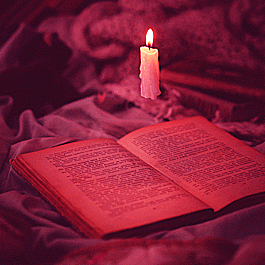
Hello Friends!! to preface: This post is not here to police anyone on what is the 'correct' way to practice. My aim on this post is to be culturally and magically informed, so this isnt going to be a take down of any belief or path line. Instead this post is offered up as a way to not only build your own moral frame work, but get you thinking about where you stand magically and enhance how you practice! Our moral frameworks are all unique, something that would be a faux pas in your practice might be something thats culturally common in others, so lets throw on our thinking caps and get started!
What is building an ethical and moral framework?
Building an ethical background in witchcraft involves establishing a set of principles, values, and guidelines that guide your magical and spiritual practices! In essence It helps ensure that your actions align with your moral compass (Wherever it may lie). This background can help you make informed decisions, cultivate energy, and maintain a respectful and balanced relationship with both you and your magic.
Some religions and paths have their own moral and ethical framework, for example lyma is this idea of "something to be washed away" and is a big deal when practicing within Hellenic Spaces! It would be immoral to approach an altar without washing your hands if they were dirty, but on the flip side some cultures actively encourage dirty hands like people who worship earth within their gardens. Depending on your path you might have a specific framework.
Another aspect is moral frameworks change and that is ok!! Its important we aren't stagnate and its ok to change your mind and feel like you want to change things up. That is totally reasonable and people do it all the time like with politics, religious affiliations, jobs, and more! Ethical and Moral compasses can change just like we do.
How to build an ethical framework
Self-Reflection: Start by exploring your own values, beliefs, and moral code. Reflect on what is important to you, what you stand for, and how these values relate to your magical practices. Also now would be the time to decolonize your beliefs and explore your biases. Its ok to acknowledge your bias, as long as you are working through it. If you dont know what decolonizing your beliefs is I left a helpful video above, just click 'decolonize your beliefs'
Research and Study: Deep dive into different ethical systems and philosophies. Familiarize yourself with various witchcraft traditions, such as New age spirituality, Pagan magical systems, and country/area specific + their associated ethical guidelines. Read books and articles about ethics in witchcraft whether you agree or disagree. During this time you are simply collecting as many perspectives as possible and comparing them to how you feel, don't feel pressured to follow something if you don't feel it applies to you.
Connect with a Mentor or Community: If possible, seek guidance from an experienced witch or spiritual space who can share their ethical insights and offer advice on building your own ethical framework. The best part is, different spaces will produce their own ethical codes of conduct. For example some spaces don't allow love spell discussion for example, which is an ethical guideline.
Create Your Own Code: Based on your self-reflection, research, and guidance, create your own personal code of ethics. This code should reflect your values and guide your magical practices. It might include principles like harm none, respect nature, work for the greater good, or take no shit. Wherever you feel you sit, walk with it. Whatever comes natural to you explore it. Write down what you believe as a symbol, but do so in pencil so you can change it as needed!
Regularly Reevaluate: As you gain experience and your understanding of ethics evolves, revisit and update your ethical code. It's important to grow as your spiritual journey progresses like I mentioned above. You are not a static person, allow yourself to experience your moral compass and how to bends. Allow yourself to be fluid and honest. Not everyone is 'love and light' or 'fuck authority' your allowed to be who you need to be!
Different Types of Ethics in Witchcraft:
Note: This is not every type of ethics, but rather a couple examples of the ethics you may see in your research and which group it belongs too. This area is not meant to endorse or critique an ethical guideline but instead showcase the many that do exist.
The Wiccan Rede: "An it harm none, do what ye will." This is a central ethical guideline in Wicca, emphasizing the avoidance of harm to others as a core principle. Another one is The Threefold Law, this law suggests that the energy you send out, whether positive or negative, will return to you threefold (three times what you sent out). This encourages practitioners to be mindful of their actions.
Green Witch Ethics: Green witches emphasize their connection to nature and the importance of nurturing and protecting the environment. Their ethical background often centers around conservation, sustainability, and working with the Earth's energies respectfully.
Personal Responsibility: Some witches adhere to a more individualistic code of ethics, focusing on personal responsibility and accountability for their actions.
Balancing Left hand and Right hand: For some, ethical considerations involve finding a balance between Right and Left hand magic, and acknowledging the potential consequences of working with both, one, or neither. The right and left hand path are types of magical systems that involve different attitudes towards magic, the right hand emphasizing healing and selflessness, and the left hand emphasizing individuality and shadow aspects.
Respect for Spirits and Deities: Many witches emphasize the importance of showing respect and gratitude to the spirits, deities, and entities they work with, recognizing their agency and autonomy.
Are there any absolutes that I should be aware of?
Absolutes are ethical things that you do need to make sure you are integrating! These are really important things to note when you are learning, because if you do choose to disregard these you could contribute to some really bad concepts that intrinsically cause harm to real people
Respect - Cultural awareness, avoiding appropriation, and looking out for other people can be important. Its important that you fully evaluate a moral system before indulging in it. For example: In the love spell discussion and lot of cultural practioners voices are left out of the discussion, same with baneful discussions. Its important to listen to many groups of people and take stances that dont turn peoples cultures into a monolith, demonize them, or silence them.
Hate groups and cults - Its important that you check where a belief comes from and see if it matches with any hate groups or cult rhetoric. These groups create really flashy and easy to digest claims to try and push an agenda kind of like a salesmen. Their whole job is to try and push you into their group so they can get money, power, fame, and in some cases carry out atrocities. This corresponds with that decolonization conversation from earlier, because it can help keep you and other witchy friends safe!
Nuance - Its important to keep nuance in the conversation. Don't take extremely black and white stances if you aren't knowledgeable on the subject. I think even advanced practioners need to remember to keep nuance in their opinions and keep an open mind when presented with new information or moral ideals. Keep an open dialogue when you are having conversations, and remember to keep asking yourself why you believe the things you do.
Remember that there is no one-size-fits-all approach to building an ethical background in witchcraft. Your ethical code should be a reflection of your personal beliefs and values. It's essential to be true to yourself and to strive for a harmonious practice that aligns with your own spiritual journey! Enjoy the ride :)
#witchblr#pagan witch#witch#magical theory#grimoire#witchcraft#culturalexploration#baby witch#ethics#moral compass#nuance#researching magick#magick#witch community
102 notes
·
View notes
Note
Hey! Not sure if you take asks or not, but do you have any advice for a baby witch?
YES! First, asks are always open, and I appreciate you sending one! Secondly, of course I have some advice! Let's get into it!
(1) Decolonize your craft
Decolonizing your craft is essential to witchcraft. Making sure you don't take part in practices that are closed to you, and making sure that you don't use tools/methods/items that are sacred to cultures you aren't a part of is SO IMPORTANT!!! This is where I would recommend you to start your research. Here is an excellent article on what a closed practice is, but it doesn't go too deep into specific things that are closed. I think it's a good jumping off point.
Along with respecting and educating yourself on closed practices, knowing where your information is from and what biases that information may have (good or bad) is also important. This goes along with what materials you use and where they come from (is this ethically sourced, is this a closed item, who profits off of this item, etc.).
(2) RESEARCH A TON!!!
If you're on this blog, asking this question, you're doing this! Good job! If you search "BOS" on my blog, or click -> here , you can go to my "book of shadows" tag, and see lists of ways to start your own book of shadows (aka a ton of things to research and write down)
(3) Write everything down
Going along with that last sentence, write. stuff. down! Your craft will change and grow, and even if you're just writing what you learn in your phones notes app, you will be so happy that you have that later on. It's great to see where you came from and how far you've come, and who knows, you may need that one sigil you made 3 months ago, or maybe that random spell you wrote down ages ago is exactly what you need in your current situation. Just write things down, you'll thank yourself for it later.
(4) Don't feel like you need to fit into a box
This one is very important as well! Social media witches and pretty instagram witchcraft isn't how your craft is most likely not how your practice will look, especially not when starting out. Don't force yourself to have the most perfect altar, with allllll of these beautiful, expensive tools, and all the witchy clothes and decorations, etc. etc. etc. You honestly don't need anything but your intention to do witchcraft. Don't worry about having an "aesthetic" practice. It really isn't realistic for most people.
Also, witch "types" aren't set in stone. You don't only have to be a Green Witch, or only a Hearth Witch, or only a Sea Witch. These are just fun categories, and you don't need to commit to one or the other. I consider them mostly just tags that witches use to see the kinds of content they want to see, or to categorise themselves so others know their favorite things in their practice. If you NEED a label, but can't decide, "eclectic" is an easy thing to slap onto your practice that is all encompassing while still being labeled.
These are my biggest advice points. If anyone wants more, I'm sure I can think of more, I just wanted to get this out because I was excited to get an ask, haha.
Anyways, happy witching!
#witchcraft#witchblr#hellenic pagan#pagan witch#witch#other witchy#witches#maxtalk#witch community#witch advice#witch stuff#witch shit#baby witch#baby witch advice#witch tips#beginner witch#witchcraft 101#witch blog#witches of tumblr
106 notes
·
View notes
Text
I'm just gonna go ahead and say it.
Y'all need to stop comparing Wicca to Christianity.
Stop claiming that a pagan religion that's not even a full century old has the same level of influence or the same cultural and historical impact as one that has existed for more than two thousand years, spending a good deal of that time as the official faith of multiple countries.
Stop transferring your issues with cultural Christianity onto a pagan religion that, until very recently, was the ONLY pagan religion publicly and legally recognized as a religion at all, and which laid the groundwork for ALL of the positive perception and freedom of practice that we enjoy as witches today.
Stop pretending that religions and people don't change and that problematic foundations automatically mean problematic followers. If that were true, there's not a single one of us that would escape being tarred with that brush. ALL of us have been problematic at some point. The point is not to Never Ever Be Problematic At All; it's to abjure what is most egregious (racism, sexism, LGBTQ-phobia, etc) and to correct and improve the parts of yourself that need it in an ongoing process. Purity culture is poison and it will destroy us all.
If you really want to get away from the "problematic" ideas connected with the origins of Wicca and the widespread presence of Wiccan ideas extent within the modern witchcraft community, stop going on about unbroken lines and secret goddess cults and the Burning Times, and start examining and decolonizing your own ideas and practices.
Learn to identify the difference between Wiccan ideas and New Age ones. Yes, there is a difference and yes, it matters. And learn your history. We would not be where we are without Wicca. The modern witchcraft community simply would not exist.
#witchblr#witchcraft#wicca#Witchstorian over here getting real tired of self-righteous witches demonizing their own community for clout#So sick of this puritanical resurgence#pagan
524 notes
·
View notes
Text
Caribbean Folk Saints and Mighty Dead: A Precursor
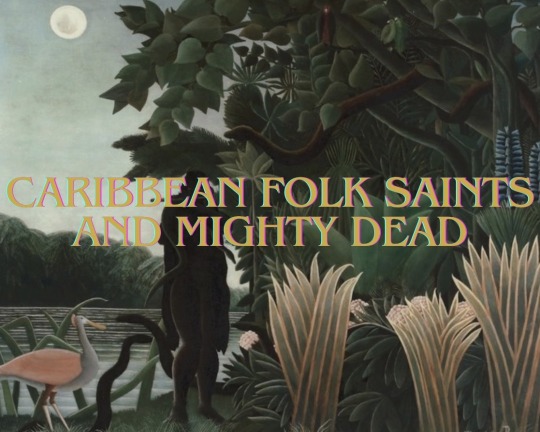
We all have family members who take on an almost Mythic quality after they pass on. They may have been a character in life, or a perhaps a spiritual practitioner. Maybe they were known for their generosity, or lack of it, or their strength or brilliance. Nonetheless, it is someone who, even in death, still makes an impact. In personal practices, we may work with these ancestors for guidance and healing, but what happens when their influence spreads past your family, into the local community or even entire country? This and many other strange circumstances often explain the origin and powers of Folk Saints and Elevated Dead. I will be going into the various Folk Saints and Deified Ancestors of the Caribbean, (including Florida), but before I can do that I need to explain where these spirits come from, and why they are so potent in our everyday lives.
What are Folk Saints and Mighty Dead?
Folk Saints and Mighty Dead are spirits of dead people who were either elevated in life, or became elevated after death. Their elevation often is then connected to their ability to grant various petitions made to them. Some of the Folk Saints I will be talking about were used to disguise other figures who were outlawed by the Colonial government at the time, while others are various figures of marginalized communities who gained sorcerous or otherworldly reputations after death.
Cuba and Florida are Lands of diaspora and syncretism. Many different traditions abound and each tradition has multiple lineages, so the classification of spirits differs depending on the worldview of the person explaining. Some practitioners work within a framework of Catholicism, some use elements and some flat-out reject Catholicism completely for decolonization purposes. For this reason, I have differentiated Folk Saints from the Mighty Dead.
Folk Saints will include those spirits who are worked with in a Catholic context, but are usually not canonized or not at first. On the other hand, the Mighty Dead will include spirits who are venerated amongst Indigenous and African traditions in Cuba as well as the surrounding areas, as to not group them under a title created by Colonizers. If you are Cuban or Caribbean, these Folk Saints and Mighty Dead offer power at a closer degree because they are more proximal to your Spirit Court, and may even already have bonds with them.
It is important to note, spirits like Orisha and Cemí have very specific protocols, manners and taboos when approaching them, so this is best done with the help of a priest, such as Oloricha or Babalawo, or a Taíno Behike. These are not energies you simply feel drawn to and work with. Orisha and Cemi are in some cases Deified Ancestors and others Personified Forces of Nature, among other things. This varies from the Ancestors and Spirits I will be discussing in this series.
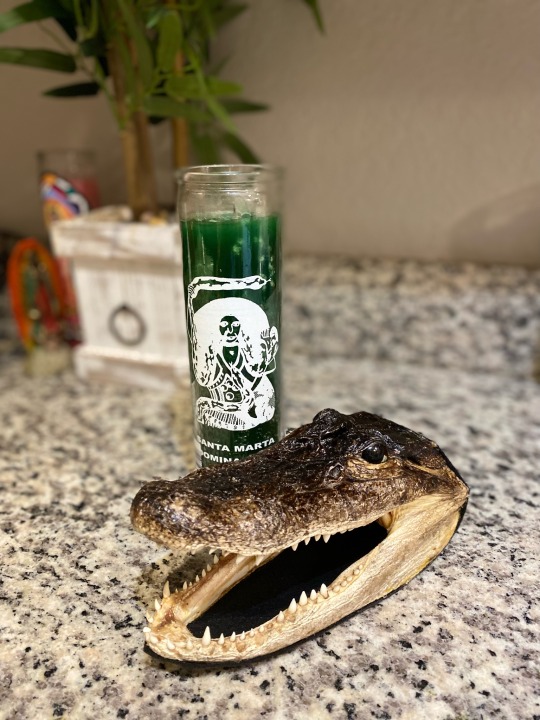
Benefits of Working with The Mighty Dead
Folk Saints and Ancestors give us a closer connection to the divine through their proximity to the Divine and their individual virtues and personalities. As with all spirit relationships, you will get out what you put in.
Folk Saints who are related to the Land you live on, such as Uncle Monday or Bessie Graham for us Floridians, can help to deepen your connection with the local community. They can help you to further your relationship with the Earth and introduce you to other Land spirits.
Spirits related to your Ancestry can help to work through generational issues. Some ancestral spirits, like José Martí or Guamá for us Cubans, are related to ideas of War, Rebellion, and overcoming oppression. These spirits can be worked with for the same pursuits of defeating oppressors in the modern day. Each spirit has a story and is multi-faceted, so it really depends on what your connection is to the Spirit and what you are capable of offering them.
How to Work with Deified Dead
Working with these spirits is individual to each spirit, based on what their heritage is, as well as their personal tastes. When starting out, it’s best to keep things simple. Instead of going and creating an entire altar dedicated to a spirit, begin by praying about it at your Bóveda or ancestral altar. Here, you may find that a spirit is not compatible with your current situation, or doesn’t want to work with you ever! Should the omens be good, however, and you may begin establishing a connection to that spirit Research and talking to other devotees can give you great insight into what a relationship with that Spirit can look like.
My formula for reaching out to these spirits is always different, but I follow basic principles. I always begin with a representation of the spirit, a small offering and a candle. The representation can be anything, from a statue to a printed picture or even just their name on some paper. The offering is in most cases water until the spirit makes other wants known to me, but when a spirit doesn’t take water I offer food or tobacco instead. The candle is something I was taught helps to enhance spirit communication, carrying messages between the worlds. It is helpful to research about whoever you are attempting to communicate with, and if possible you should speak to other practitioners who work with the same Spirit. Often times, this is someone-you-know’s father or grandmother. From here, you should sit with whatever entity you are contacting, allowing yourself to experience a personal relationship with them. I will share individual experiences of what each spirit has been like in practice for me, or people I know, but for beginning this is a good basic way to start out.
I look forward to sharing more about these incredible figures who influence my favorite corner of the world to this day.
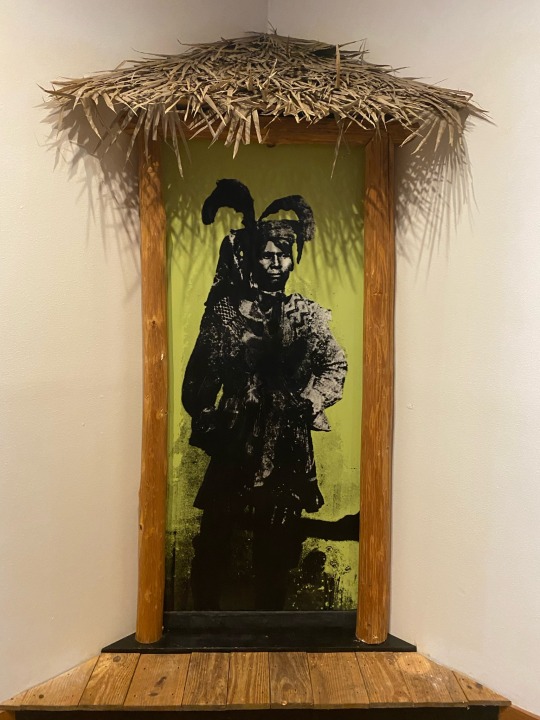
Paz y Progreso 🕯️
#witchcraft#florida#bioregional animism#bruja#brujeria#florida witch#santeria#swamp witch#witch#traditional witchcraft#cubanfolkmagic#cuban#cuba#taino spirituality#taino#folk magic#folk witch#espiritismo#atr#folkloric witch#animism
51 notes
·
View notes
Text
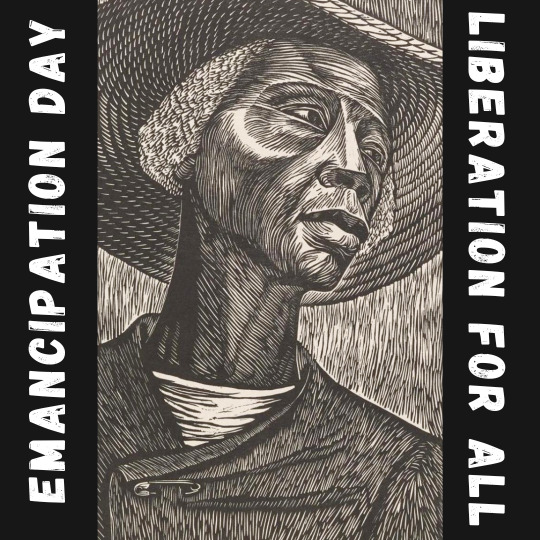
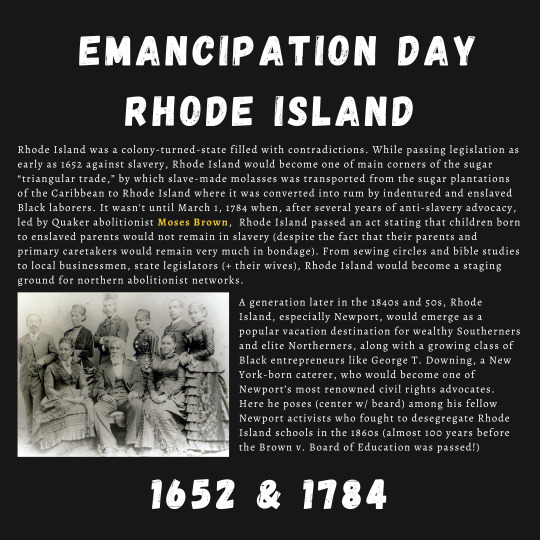
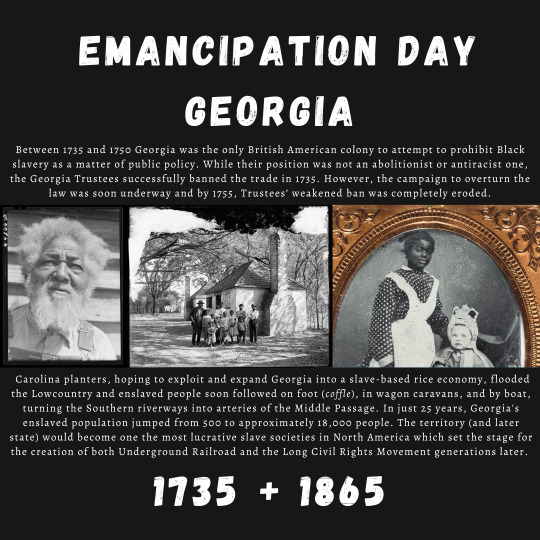
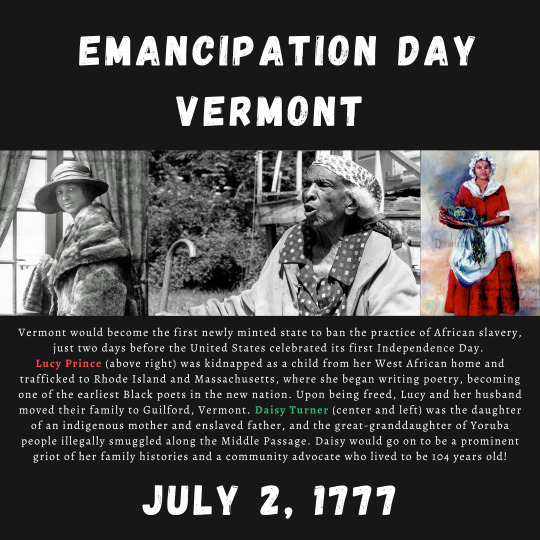
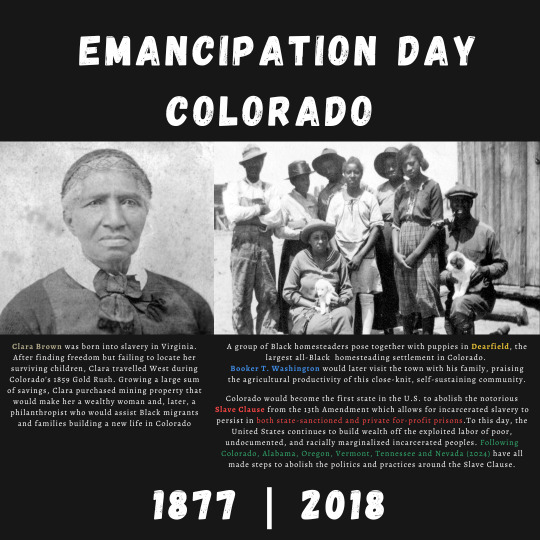
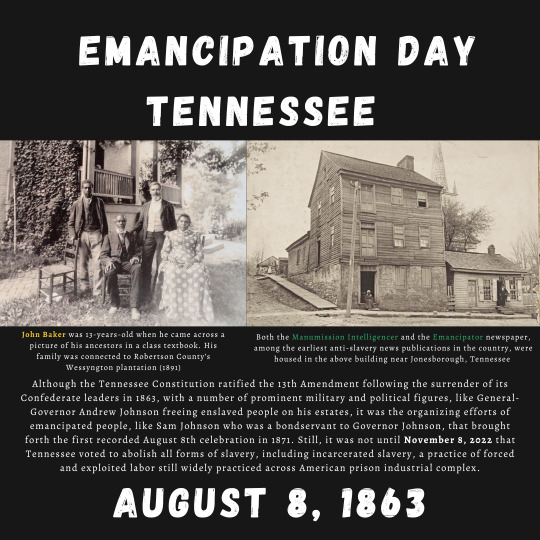
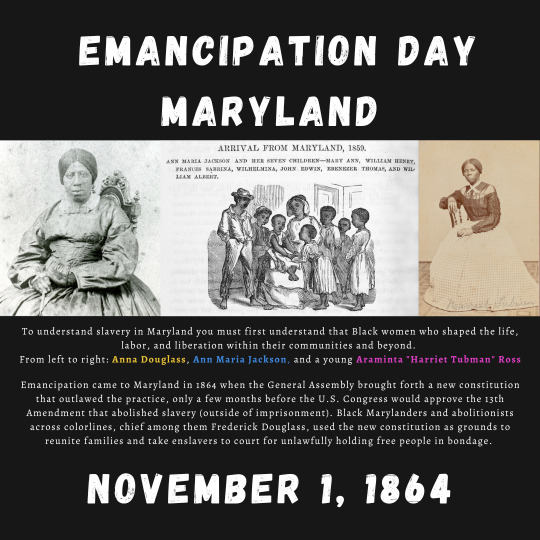
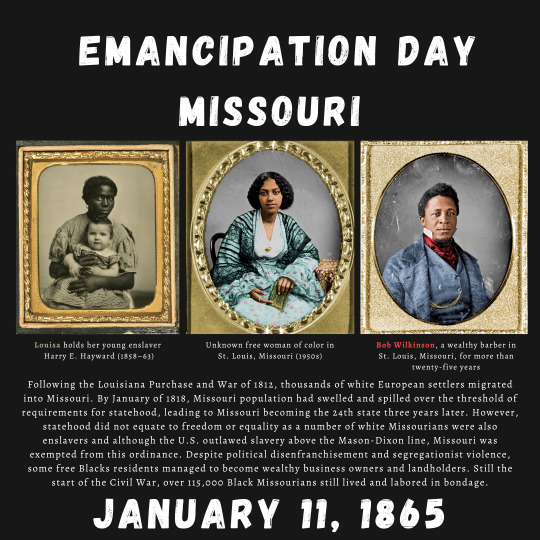
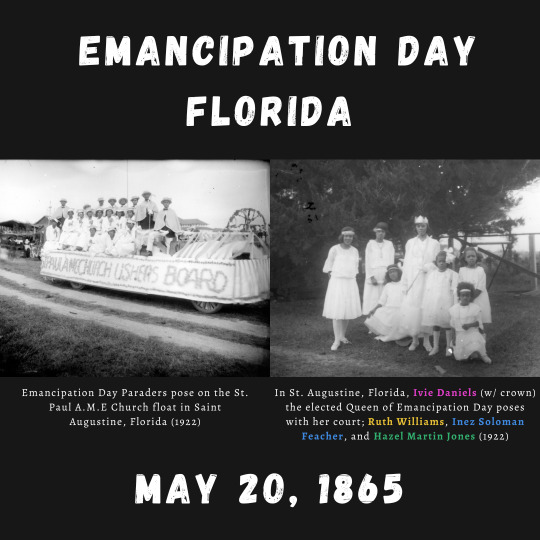
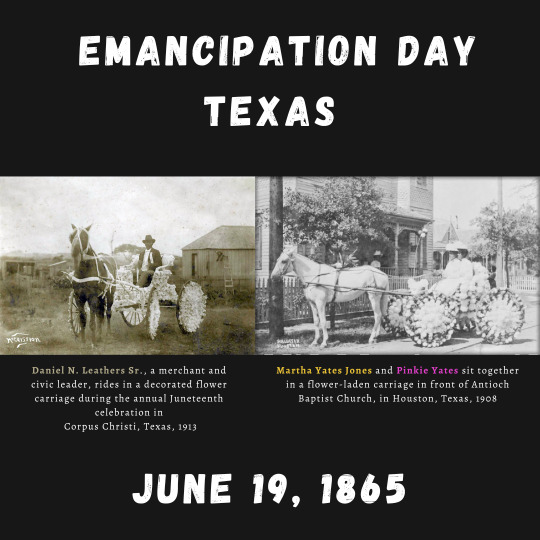
On August 8, 1863, Tennessee ratified the 13th Amendment, abolishing the domestic slave trade of Black + indigenous folks in the state. 159 years later in 2022, Tennessee folks voted to abolish all forms of slavery in the state, including the "Slavery Clause" that allows for incarcerated slavery to persist in both state-sanctioned + private for-profit prisons.To this day, the United States continues to build wealth off the exploited labor of impoverished, (dis)abled, undocumented + racially marginalized people who are incarcerated.
Each community and country that participated in the Transatlantic Slave Trade has its own emancipation day (or year).
And yet, as of 2023, Colorado, Alabama, Oregon, Vermont, Tennessee + Nevada (2024) are the only U.S. states who have made steps to abolish slavery in all its forms. That's not even touching how slavery, both state-sanctioned and illegal bondage, continues to bleed into our everyday places from child labor + forced s*x work to penal plantations and chocolate factories (looking at you at hershey chocolate)
In this second wave of Jim & Jane Crow flooding our world, we must arm ourselves with the tools to disrupt systems, distribute resources + deepen our collective action + good trouble ~
If you wanna explore the full Emancipation post + readings, come join us in the garden community over on Patreon where we upRoot our miseducation through history lessons, community conversations + book talks + decolonizing our everyday practic, our classrooms + our communities.
Reclaim your emancipation + immerse yourself in the ancestral, antiracist liberation! 🖤✊🏾✨️
#prison abolition#our world#black lives matter#ecosystem of white supremacy#our history is your history#politics#13th amendment#padawan historian#cite black women#reclaim the fourth#emancipation day
88 notes
·
View notes